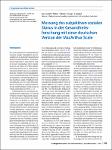Messung des subjektiven sozialen Status in der Gesundheitsforschung mit einer deutschen Version der MacArthur Scale
Hoebel, Jens
Müters, Stephan
Kuntz, Benjamin
Lange, Cornelia
Lampert, Thomas
Klassischerweise wird der sozioökonomische Status (SES) in der Gesundheitsforschung mit objektiven Indikatoren (Bildung, Beruf, Einkommen) bestimmt. Ergänzend wird seit einigen Jahren zunehmend auch der subjektive soziale Status (SSS) erfasst, meist mithilfe der MacArthur Scale. In diesem Beitrag wird die Konstruktvalidität einer deutschsprachigen Version dieses Instruments untersucht. Zudem wird der Frage nachgegangen, ob der SSS über den objektiven SES hinaus mit der gesundheitlichen Lage zusammenhängt. Für die Analysen werden Daten einer bevölkerungsbasierten Pilotstudie herangezogen, die im Rahmen der Studie „Gesundheit in Deutschland aktuell“ (GEDA) vom Robert Koch-Institut durchgeführt wurde (n = 1571; Alter: 18−79 Jahre). Der SSS wurde mit der 10-stufigen MacArthur Scale erfasst. Dabei konnten sich die Befragten selbst auf der „sozialen Stufenleiter“ platzieren. Am stärksten korrelierte der SSS mit konstruktverwandten Indikatoren wie einem mehrdimensionalen SES-Index und den objektiven SES-Einzelindikatoren Einkommen, berufliche Stellung und Bildungsgrad (r = 0,32−0,60; p In health research, socio-economic status (SES) is traditionally assessed using objective indicators (education, occupation, income). For a couple of years, there has been a growing body of studies that additionally assess the subjective social status (SSS) of respondents, mostly using the MacArthur Scale. The aim of this study was to examine the construct validity of a German-language version of this instrument and to investigate whether SSS is associated with health over and above objective SES. Analyses were based on data from a population-based pilot study carried out within the ‘German Health Update’ (GEDA) study conducted by the Robert Koch Institute (n = 1,571; age: 18−79 years). SSS was measured with the MacArthur scale asking respondents to place themselves on a 10-rung “social ladder”. The strongest correlations to SSS were found with measures of similar constructs such as a multidimensional index of objective SES, income level, occupational position and educational attainment (r = 0.32−0.60; p
No license information

